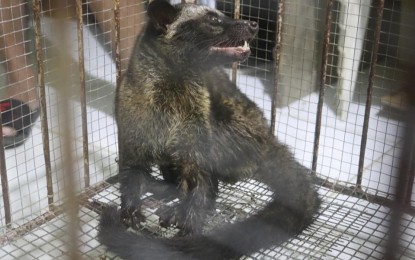
CALL FOR CONSERVATION. The injured civet cat rescued by a group in Guiuan, Eastern Samar in this July 24, 2021 photo. The Department of Environment and Natural Resources in Eastern Visayas has renewed its call for conservation of civet cats following the recent rescue of the animal in Guiuan town. (Photo courtesy of Guiuan Marine Resource Protected Landscape and Seascape)
TACLOBAN CITY – The Department of Environment and Natural Resources (DENR) in Eastern Visayas has renewed its call for the conservation of civet cats following the recent rescue of an injured rare animal species in Guiuan, Eastern Samar.
In a statement sent to reporters late Thursday, DENR Eastern Visayas director Tirso Parian, Jr. reiterated his call to the public to report wildlife crimes and violations immediately since these are considered threats to the ecosystem.
“Civet cat plays an important role in the ecosystem by propagating the seeds it spews after eating. This natural process contributes to growing a variety of plants and fruit trees in the forests,” Parian said.
The office of Guiuan Marine Resource Protected Landscape and Seascape (GMRPLS) rescued a Philippine palm civet locally known as “garong” at the town center of Guiuan on July 24.
Rescuers discovered the adult civet cat had injuries on its left eye and mouth. It was immediately brought to the Community Environment and Natural Resources Office (CENRO) Guiuan field office for proper care and treatment.
After recovering, the civet cat was released to its natural habitat in Guiuan town on July 29.
“Our office is grateful to everyone who shows concern for our wildlife and their natural habitat. Our call continues - let’s keep our wildlife such as the civet cats alive and protected in their natural habitat,” Parian added.
Civet cats are considered one of the country’s rare and endemic species. This wildlife excretes coffee seeds considered as the world’s most expensive coffee, making it a high-value animal for some households and coffee manufacturers. (PNA)
